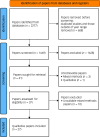Secondary stressors and their psychosocial impacts on healthcare staff: lessons from a qualitative systematic review from the COVID-19 pandemic in the UK
- PMID: 40383645
- PMCID: PMC12089815
- DOI: 10.1192/bjo.2025.51
Secondary stressors and their psychosocial impacts on healthcare staff: lessons from a qualitative systematic review from the COVID-19 pandemic in the UK
Abstract
Background: Extreme events (e.g. floods and disease outbreaks) can overwhelm healthcare workers (HCWs) and healthcare systems. During the COVID-19 pandemic, high levels of distress and mental ill health were reported by HCWs.
Aims: To examine and synthesise research findings reported in the qualitative literature regarding the stressors, and their psychosocial impacts, faced by HCWs in the UK during the COVID-19 pandemic, and to provide lessons for future support.
Method: Qualitative articles were identified in EMBASE and OVID (preregistered on PROSPERO: CRD42022304235). Studies were required to have been published between January 2021 and January 2022 and to have examined the impact of COVID-19 on UK HCWs. We included 27 articles that represented the experiences of 2640 HCWs, assessed their quality using National Institute for Health and Care Excellence criteria and integrated their findings using thematic synthesis.
Results: Several secondary stressors were identified, including lack of personal protective equipment, ineffective leadership and communication, high workloads and problems stemming from uncertainty and a lack of knowledge. Stressors were related to adverse psychosocial outcomes including worry, fatigue, lack of confidence in oneself and senior managers, impacts on teamwork and feeling unappreciated or that one's needs are not recognised.
Conclusions: Our thematic synthesis moves beyond simply mapping stressors faced by HCWs by considering their antecedents, origins and psychosocial impacts. Utilising a theoretical framework that points towards systemic deficiencies, we argue that secondary stressors can be modified to remove their negative effects. Consequently, workforce planning should shift from focusing on individual change towards amending psychosocial environments in which HCWs work.
Keywords: COVID-19; extreme events; healthcare; secondary stressors; stress.
Conflict of interest statement
R.W. is a Deputy Editor of
Figures
Similar articles
-
Coping strategies used by migrant healthcare workers to support their mental health during COVID-19 in the United Kingdom: a qualitative analysis.Eur J Psychotraumatol. 2024;15(1):2415747. doi: 10.1080/20008066.2024.2415747. Epub 2024 Oct 30. Eur J Psychotraumatol. 2024. PMID: 39474804 Free PMC article.
-
Barriers and facilitators to healthcare workers' adherence with infection prevention and control (IPC) guidelines for respiratory infectious diseases: a rapid qualitative evidence synthesis.Cochrane Database Syst Rev. 2020 Apr 21;4(4):CD013582. doi: 10.1002/14651858.CD013582. Cochrane Database Syst Rev. 2020. PMID: 32315451 Free PMC article.
-
Exposure to moral stressors and associated outcomes in healthcare workers: prevalence, correlates, and impact on job attrition.Eur J Psychotraumatol. 2024;15(1):2306102. doi: 10.1080/20008066.2024.2306102. Epub 2024 Feb 9. Eur J Psychotraumatol. 2024. PMID: 38334695 Free PMC article.
-
Experiences of the SARS-CoV-2 pandemic amongst Australian healthcare workers: from stressors to protective factors.J Hosp Infect. 2022 Mar;121:75-81. doi: 10.1016/j.jhin.2021.12.002. Epub 2021 Dec 10. J Hosp Infect. 2022. PMID: 34902500 Free PMC article.
-
Causes and solutions to workplace psychological ill-health for nurses, midwives and paramedics: the Care Under Pressure 2 realist review.Health Soc Care Deliv Res. 2024 Apr;12(9):1-171. doi: 10.3310/TWDU4109. Health Soc Care Deliv Res. 2024. PMID: 38662367 Review.
References
Publication types
LinkOut - more resources
Full Text Sources


